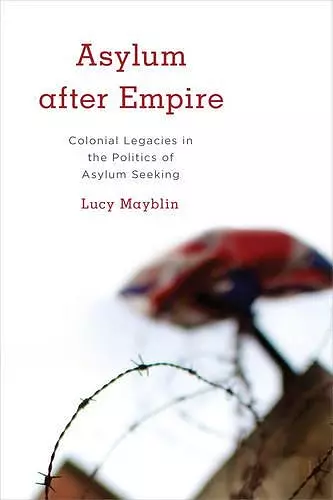Asylum after Empire
Colonial Legacies in the Politics of Asylum Seeking
Format:Hardback
Publisher:Rowman & Littlefield International
Published:5th Apr '17
Currently unavailable, and unfortunately no date known when it will be back
This hardback is available in another edition too:
- Paperback£35.00(9781783486168)

Asylum seekers are not welcome in Europe. But why is that the case? For many scholars, the policies have become more restrictive over recent decades because the asylum seekers have changed. This change is often said to be about numbers, methods of travel, and reasons for flight. In short: we are in an age of hypermobility and states cannot cope with such volumes of ‘others’. This book presents an alternative view, drawing on theoretical insights from Third World Approaches to International Law, post- and decolonial studies, and presenting new research on the context of the British Empire. The text highlights the fact that since the early 1990s, for the first time, the majority of asylum seekers originate from countries outside of Europe, countries which until 30-60 years ago were under colonial rule. Policies which address asylum seekers must, the book argues, be understood not only as part of a global hypermobile present, but within the context of colonial histories.
Asylum After Empire is a landmark book. It is a forensic account of how asylum became central to contemporary politics in the West. Mayblin blends insightful theoretical analysis with detailed historical enquiry to show how asylum is produced by, and is productive of, colonial modernity – it is the continuation of 19th and 20th century differential rights regimes by another name. Contemporary debates about refugees, Mayblin demonstrates, are really debates about human hierarchy. Asylum After Empire is not just a fine piece of scholarship, it matters. Read it. -- George Lawson, Associate Professor, London School of Economics
Lucy Mayblin takes the reader on a seminal non-Eurocentric historical sociological journey that problematizes the current European asylum crisis, revealing how it has emerged not upon a discursive foundation of universal human rights but on one of human hierarchy; a discourse which remains today as the potent legacy of connected colonial histories which she traces back over a 200-year period. Such is the originality and seminal importance of this book that it has the potential to re-track Refugee Studies/Migration Studies and associated ventures connected to the disciplines of Sociology, Politics and International Relations onto fresh, non-Eurocentric terrain. -- John M. Hobson, Professor of Politics and International Relations, University of Sheffield
This groundbreaking book is an illuminating application of post and de-colonial thought and the literature on race and racism to the policy of asylum. It challenges some of the fundamentals of refugee scholarship and politics and opens up new perspectives for academics and activists alike. -- Bridget Anderson, Professor of Migration and Citizenship and Research Director at the Centre on Migration, Policy, and Society at the University of Oxford
- Winner of BSA Philip Abrams Memorial Prize 2018
ISBN: 9781783486151
Dimensions: unknown
Weight: unknown
210 pages